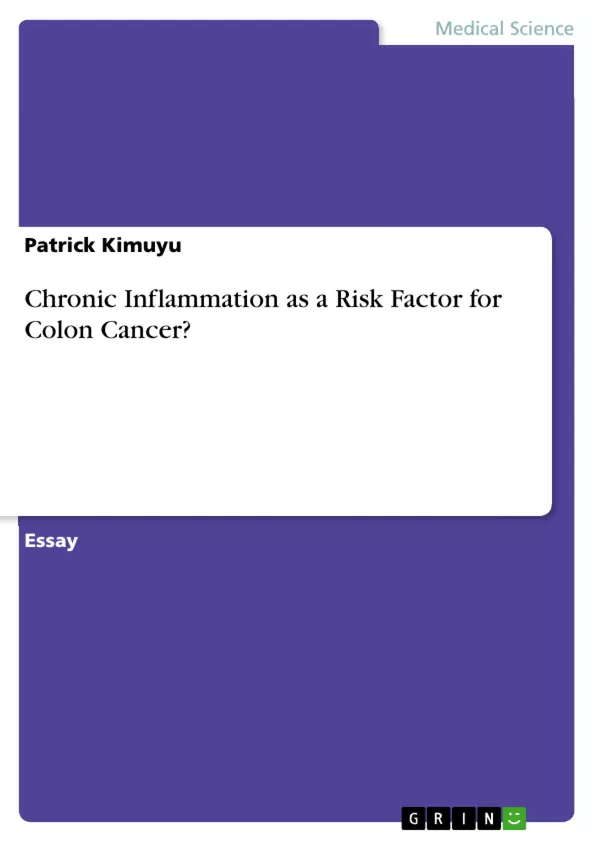Colon cancer seems to have become an enormous challenge to global public health systems although its prevalence is high in high income countries such as the U.S, Canada and Western Europe. In the U.S, colon cancer is ranked second among the leading cancer-related causes of mortality, and it is the third most common cancer in men and women. CDC reports that 131. 607 people in the U.S were diagnosed with colorectal cancer while 52,045 people died, including 24,972 women and 27,073 men in 2010.
It has been found out that the prevalence of colon cancer is related chronic inflammation, which serves as one of the most significant risk factors. Therefore, this research paper will discuss the relationship between chronic inflammation and colon cancer. It will discuss how chronic inflammation causes colon cancer, primarily with regard to etiology, and it will also discuss genetics is related to chronic inflammation.
Inhaltsverzeichnis (Table of Contents)
- Introduction
- Chronic Inflammation as a Risk Factor to Colon Cancer
- Pathophysiology of Chronic Inflammation
- Extent of Chronic Inflammation's Contribution to Cancer Etiology
- Relation of Genetics and Chronic Inflammation
Zielsetzung und Themenschwerpunkte (Objectives and Key Themes)
This research paper aims to explore the relationship between chronic inflammation and colon cancer, specifically focusing on the role of inflammatory bowel disease (IBD) in its etiology. The paper will delve into the pathophysiology of chronic inflammation, the extent of its contribution to cancer development, and the connection between genetics and chronic inflammation.
- Chronic inflammation as a significant risk factor for colon cancer.
- The role of inflammatory bowel disease (IBD) in colon cancer development.
- The pathophysiology of chronic inflammation and its relation to dysplasia.
- The contribution of chronic inflammation to cancer etiology, including the latency period.
- The interplay between genetics and chronic inflammation in the development of colon cancer.
Zusammenfassung der Kapitel (Chapter Summaries)
- Introduction: This section highlights the global health burden of colon cancer, particularly in high-income countries. It presents statistics on the incidence and mortality rates of colon cancer in the U.S. and the U.K., emphasizing the significant impact of the disease.
- Chronic Inflammation as a Risk Factor to Colon Cancer: This chapter establishes chronic inflammation as a key risk factor for colon cancer, focusing on the role of inflammatory bowel disease (IBD), which encompasses Crohn's disease and ulcerative colitis. It differentiates IBD from irritable bowel syndrome (IBS), emphasizing that the latter has no proven correlation with colon cancer.
- Pathophysiology of Chronic Inflammation: This section delves into the mechanism by which chronic inflammation contributes to colon cancer. It highlights the role of pathogens, particularly Helicobacter pylori, in triggering chronic inflammation, and discusses the process of dysplasia, where cells lining the colon become morphologically abnormal. It also mentions the involvement of reactive oxygen species (ROS) in the development of adenomatous polyps.
- Extent of Chronic Inflammation's Contribution to Cancer Etiology: This chapter explores the connection between chronic inflammation and colon cancer etiology. It explains that not all cases of chronic inflammation lead to cancer, and that the development of dysplasia plays a crucial role. It emphasizes that chronic inflammation, particularly IBD, is associated with an increased risk of colon cancer, although the latency period for cancer development can be extended.
- Relation of Genetics and Chronic Inflammation: This section examines the genetic factors associated with chronic inflammation and their impact on the development of colon cancer. It discusses the increased risk of colon cancer among individuals with a family history of IBD and highlights the role of genetic predisposition in the progression of the disease.
Schlüsselwörter (Keywords)
Colon cancer, chronic inflammation, inflammatory bowel disease (IBD), Crohn's disease, ulcerative colitis, dysplasia, adenomatous polyps, Helicobacter pylori, reactive oxygen species (ROS), genetics, etiology.
Frequently Asked Questions
How does chronic inflammation contribute to colon cancer?
Chronic inflammation leads to dysplasia, where cells lining the colon become morphologically abnormal, eventually progressing to cancerous growths over a long latency period.
What is the difference between IBD and IBS regarding cancer risk?
Inflammatory Bowel Disease (IBD), like Crohn's and ulcerative colitis, is a proven risk factor for colon cancer, whereas Irritable Bowel Syndrome (IBS) has no established correlation with the disease.
What role does genetics play in inflammation-related colon cancer?
Genetics can predispose individuals to chronic inflammation (like IBD), significantly increasing the risk of developing colon cancer if there is a family history of such conditions.
How do reactive oxygen species (ROS) affect the colon?
ROS are involved in the pathophysiology of chronic inflammation and can damage DNA, contributing to the development of adenomatous polyps and cancer.
Is Helicobacter pylori related to colon cancer?
The research mentions pathogens like Helicobacter pylori as triggers for chronic inflammation, which can set off the inflammatory cascade leading to cancer.
- Quote paper
- Patrick Kimuyu (Author), 2016, Chronic Inflammation as a Risk Factor for Colon Cancer?, Munich, GRIN Verlag, https://www.grin.com/document/381245



